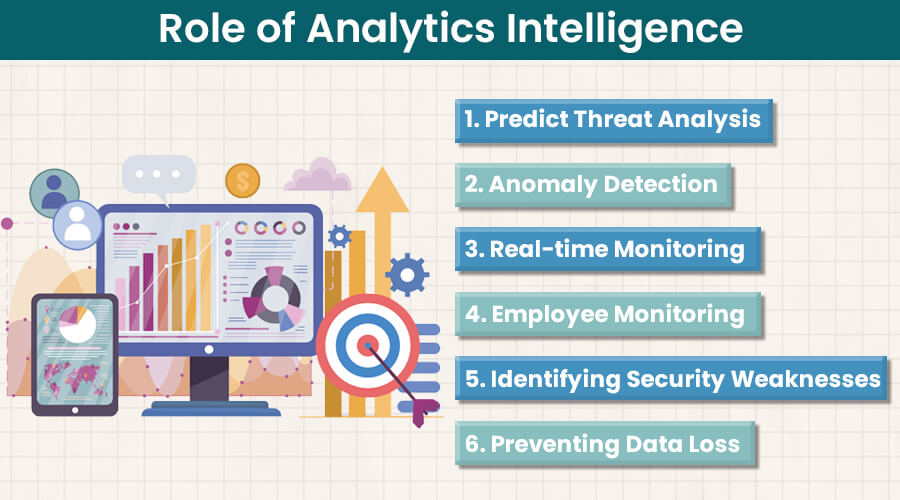What is Analytics Intelligence?
Analytics Intelligence uses advanced techniques like artificial intelligence and machine learning to understand important information from big data sets. By using machine learning and statistics techniques, analytics intelligence helps businesses predict future outcomes and suggests actions to improve results.
How Does Analytics Intelligence Help Prevent Data Breaches?
In today’s interconnected world, data breaches have severe consequences for businesses. They can include everything from financial losses to reputational damage.
According to recent studies, 80% of organizations implement employee monitoring as part of their cybersecurity strategy. This highlights recognizing the insider threat and the need for comprehensive security measures.
The rise in data breaches has prompted organizations to seek advanced solutions to safeguard their data. One such powerful tool in the battle against data breaches is analytics intelligence.
This article explores how analytics intelligence plays a critical role in preventing data breaches and safeguarding the integrity of organizational data.
Negative Impacts of Data Breaches
Data breaches can have detrimental consequences for individuals and businesses as follows:
1. Financial Losses
Organizations often incur significant financial losses due to expenses related to investigating the breach, implementing security measures, and compensating affected parties.
Furthermore, reputation damage may lead to losing customers, partners, and business opportunities, decreasing revenue and market value.
2. Reputational Damage
Organizations that suffer data breaches experience a loss of trust from customers, clients, and partners.
The damaged reputation can take years to rebuild, and some businesses may never fully recover.
3. Legal Consequences
Data breaches result in legal complications, especially if there is a failure to comply with data protection laws and regulations.
Organizations may face lawsuits and regulatory actions for not safeguarding sensitive information. Legal battles can be costly and may lead to financial losses for the business.
4. Identity Theft and Fraud
When personal information gets exposed in a data breach, individuals are at risk of identity theft and fraud. It occurs when hackers use stolen data to gain finances, open fake accounts, and conduct unauthorized transactions using individual’s personal information.
The consequences for individuals can be both financial and emotional distress, creating long-term challenges.
5. Business Disruption
Handling a data breach is a big task, and it takes a lot of time and resources, which can distract from normal business activities.
This business disruption leads to a decrease in productivity and efficiency.
The Role of Analytics Intelligence
Let’s look at how analytics intelligence contributes to preventing data breaches.
1. Predictive threat analysis
Imagine you own a company that deals with important customer information like credit card numbers and addresses. To keep this data safe, you use analytics intelligence tools that look at historical information, like previous security issues or strange activities. These tools can find patterns and clues to predict possible problems before they happen.
2. Anomaly detection
Anomaly detection helps identify insider threats where employees might intentionally or accidentally put sensitive data at risk.
3. Real-time monitoring
Traditional security measures involve regular assessments. They leave gaps that cybercriminals can exploit. Analytics intelligence, on the other hand, allows for constant monitoring of network activities in real-time.
This means it instantly sends alerts if there’s a chance of a security breach. Responding immediately helps an organization deal with cyber threats before they cause major harm.
4. Employee monitoring and insider threat detection
Analytics intelligence takes employee monitoring to the next level by tracking activities and analyzing patterns that may indicate insider threats. Analyzing user behavior can help organizations identify unhappy employees and intentional harmful activities.
5. Comprehensive endpoint security
Endpoints, including employee and IoT devices, are common entry points for cyber attackers. Analytics intelligence provides comprehensive endpoint security by continuously monitoring and analyzing activities on these devices.
It includes detecting unusual login patterns and unauthorized access attempts. Securing endpoints helps organizations create multiple layers of defense against potential data breaches.
6. Integration with information and event management systems
Analytics intelligence can team up with Security Information and Event Management (SIEM) systems to improve an organization’s security. SIEM systems gather and analyze security information from multiple sources to comprehensively view the organization’s security status. Analytics intelligence complements SIEM by adding predictive capabilities to the system.
The security team thinks the system isn’t doing enough to identify possible threats. So, they decide to add analytics intelligence to the SIEM system. With this addition, the system can now predict security issues by analyzing historical data, identifying patterns, and predicting potential security threats before they occur.
7. Identifying weaknesses in security infrastructure
Regular security audits are essential for identifying an organization’s security infrastructure weaknesses. Analytics intelligence facilitates these audits by assessing the effectiveness of existing security measures.
Identifying problems and areas of improvement helps organizations improve their defenses and stay one step ahead of potential attackers.
8. Data loss prevention
Analytics intelligence plays an important role in data loss prevention by monitoring the movement of sensitive information within an organization. It includes tracking file access, data transfers, and communication patterns.
Unusual activities trigger alerts, which allow organizations to intervene and prevent data leakage before it occurs.
Final Thoughts
Analytics intelligence has emerged as a vital force in the fight against data breaches. Today’s organizations have many compelling software products that assess everything from employee productivity to customer service initiatives. Harnessing the power of analytics can help organizations identify and react to potential threats.
As technology advances, analytics intelligence’s role in cybersecurity will become even more critical. Organizations that embrace these tools and integrate them into their security frameworks will be able to navigate cyber threats effectively.
Recommended Articles
We hope this article on Analytics Intelligence was informative and beneficial. To learn more, refer to the below articles.


